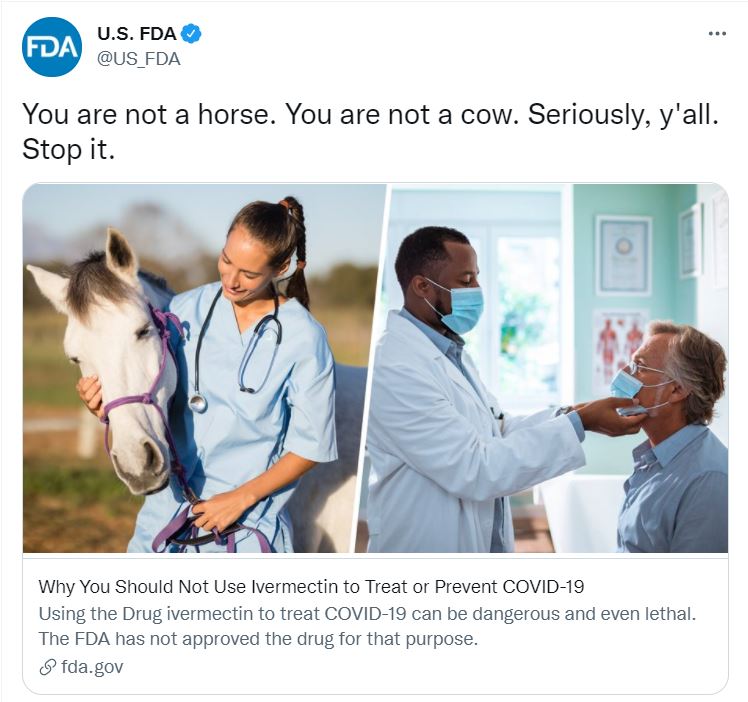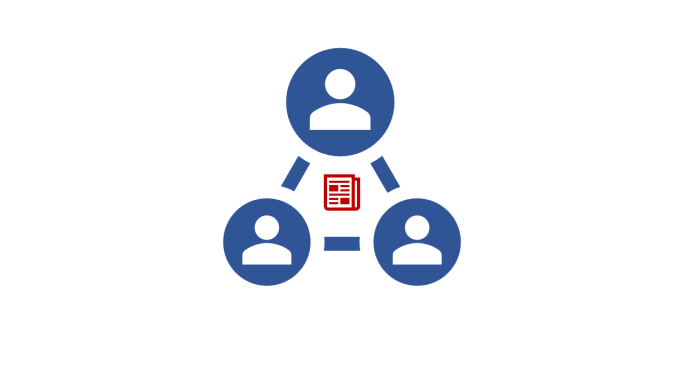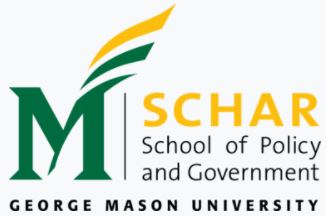The last couple weeks marked two important anniversaries: the first anniversary of the Novichok poisoning of Alexei Navalny and the eighth anniversary of the sarin attack on Ghouta. Dr. HyunJung Kim, a newly minted graduate of the Biodefense PhD program, published an article urging the Food and Drug Administration to authorize COVID-19 for children. Ivermectin, an anti-parasitic medication, has become a dangerous false treatment for COVID-19.
State Department & Biosecurity
Dr. Yong- Bee Lim, an alumnus of the Biodefense PhD Program, and Jackson duPont discuss the unintended consequences of the “reemerging conversation about lab safety in China.” These unintended consequences include rising violence against Asians and heightened geopolitical tensions. The authors also encourage augmenting the global infrastructure that mitigates biological threats by “entering into new partnerships with the international community to pioneer a cultural shift towards stronger biosafety and biosecurity, increased disease detection, and new pathways of communication and cooperation that can be activated when—not if—the next threat arises.” These goals will require collaboration with local health authorities, transparency, and an executable implementation plan. Read the article here.
Why the FDA Should Quickly Authorize Kids’ COVID-19 Vaccines
Dr. HyunJung Kim, a newly minted graduate of the Biodefense PhD program, published an article in the Bulletin of the Atomic Scientists urging the Food and Drug Administration (FDA) to authorize COVID-19 for children. People want the safest product possible for their children, but as the FDA seeks expanded safety data for pediatric COVID-19 vaccines, experts and parents alike are asking how much data is enough, especially in the face of a highly transmissible strain of the coronavirus.
The FDA has cited concerns that the Pfizer and Moderna trials of pediatric COVID-19 vaccines were not large enough to detect rare side effects such as myocarditis, an inflammation of the heart. But should the government be paying such close attention to a rare condition at the possible expense of quicker access to pediatric vaccines at a time when the number of cases among children is shooting up? The FDA determined that the benefits of COVID-19 vaccines exceed the risks when it issued the authorizations for adolescent use as well as for adult use.
Careful and cautious approaches to pediatric vaccine development are very important because children can respond differently to vaccines than adults. Since the delta variant has caused a surge of pediatric COVID-19 cases, however, the government’s request for bigger trials and a longer period of follow-up means the United States may miss a critical time for protecting children from the pandemic. The pediatrics group wrote a letter to the FDA asking for more urgency in approving pediatric vaccines. Read Kim’s article here.
The Bioeconomy: A Primer
The Congressional Research Service recently released a primer on the bioeconomy that delves into policy considerations for the US. The term bioeconomy refers to the share of the economy based on products, services, and processes derived from biological resources (e.g., plants and microorganisms). The bioeconomy is crosscutting, encompassing multiple sectors, in whole or in part (e.g., agriculture, textiles, chemicals, and energy). Many predict that the bioeconomy will be a key component of the future economy. Specifically, many view the development of and transition to predominantly a bioeconomy as a means to address grand challenges such as climate change, food security, energy independence, and environmental sustainability. Advancing the bioeconomy is also viewed as an opportunity to create new jobs and industries, improve human health through the development of new drugs and diagnostics, and boost rural development. Some experts estimate the direct economic impact of bio-based products, services, and processes at up to $4 trillion per year globally over the next 10 years.
US competitiveness and leadership in the future global bioeconomy is uncertain. Other countries are adopting comprehensive policies and strategies to advance their bioeconomies. Such efforts have the potential to challenge US leadership in biotechnology and other bioeconomy-related sectors that many view as critical to national security and economic competitiveness. Congress may consider a number of issues regarding advancement of the US bioeconomy, including the development and implementation of a national bioeconomy strategy, federal investments in bioeconomy-related research and development, expanding the bioeconomy workforce, promoting and furthering the development of regional bioeconomies, increasing both the market for bio-based products and services, as well as public awareness and acceptance of bio-based products and services. Conversely, Congress may decide there is no need to restructure federal activities and policies, including some long-standing efforts (e.g., bio-based fuels or agricultural biotechnology), under a bioeconomy framework. Congress may decide to pursue bioeconomy-related policies through new or existing sector-specific efforts, or it may decide current policies and activities are sufficient. Read the report here.
Ivermectin
Ivermectin is an anti-parasitic medication used to treat certain parasitic worms in humans and livestock. The drug is now the latest false cure for COVID-19. The Food and Drug Administration (FDA) has highlighted that ivermectin is not approved for use in treating or preventing COVID-19 in humans, and that taking this medication in large doses is dangerous. The Centers for Disease Control and Prevention (CDC) posted an official health advisory warning the public away from using ivermectin in any form to treat COVID-19. The forms used for humans versus animals differ in the concentrations of active ingredients and the types of inactive ingredients added to the drug. Yet, some are even taking the ivermectin paste formulated for horses. Overdoses of the medication can lead to vomiting, allergic reactions, seizures, coma, and death. America’s Frontline Doctors (AFLD) is the primary promoter of using ivermectin against COVID-19, inaccurately claiming that it is a safe and effective treatment for the viral disease. The founder of this group stormed the US Capitol on 6 January. Research Square removed a non-peer-reviewed study about the medication’s potential as a COVID-19 treatment; the research was deemed to be flawed. In effort to combat the misinformation about the anti-parasitic, Facebook is removing “any content that attempts to buy, sell, donate or ask for Ivermectin.” Reddit is reviewing the ivermectin communities on its platform for misinformation as well. Unfortunately, warnings from the FDA and CDC have yet to curtail interest for the drug on Facebook and Reddit.
Beyond the Lab-Leak Question: Focusing on Global Efforts to Address Biological Threats
Dr. Yong-Bee Lim, a recent graduate of the Biodefense PhD program, co-authored a brief about the capabilities and gaps of the Department of State for addressing biological threats. This is the fourth briefer in the Key US Initiatives for Addressing Biological Threats series. State’s critical activities regarding biological threats include: (1) leading US engagement in fora like the Biological Weapons Convention (BWC) and promoting norms against biological weapons; (2) building capacity with partner nations via the Biosecurity Engagement Program; and (3) working through more than 270 embassies, consulates, and missions worldwide to lead and support arms control and counterproliferation efforts around the world. The authors offer several recommendations to maximize the capabilities of State for addressing biological threats: (1) leverage existing and emerging technologies to assist in detection, attribution, and verification of treaty compliance; (2) expand diplomacy and programs for pathogen early warning; and (3) appoint a special envoy and increasing biorisk expertise across the US diplomatic corps. Read the briefer here.
US Intelligence Community’s Investigation into the Origin of COVID-19
Following the 90-day investigation order by President Biden, the US intelligence community was unable to reach a consensus regarding the origin of the COVID-19 pandemic. In sum, the investigation was inconclusive. The investigation’s single robust conclusion is that the novel coronavirus was not a biological weapon. Dr. Robert Garry, a virologist at Tulane University, stated that the investigation’s report exceeded his expectations. This report also highlights that the “intelligence and scientific communities lack the clinical samples and other data from the earliest COVID-19 cases needed to make a conclusive assessment of the origins of COVID-19.” The granular details of the intelligence community’s investigation are not available to the public. After the results of the investigation were released, Biden made a statement that the US will continue to search for the origins of the pandemic, and he “condemned China for its lack of cooperation, and pressed Chinese officials to cooperate fully with the WHO’s phase-two investigation.” China is not expected to cooperate with US intelligence agencies, whose goals will be perceived as political. The “Unclassified Summary of Assessment on COVID-19 Origins” published by the Office of the Director of National Intelligence is available here.
China’s Disinformation Response to COVID-19 Origin
China has launched a disinformation campaign claiming that SARS-CoV-2 originated from Fort Detrick, a US military base in Maryland that houses biomedical laboratories. This campaign is seen as a reaction to the recent investigation into the pandemic’s origin conducted by the US intelligence community. The investigation was inconclusive, leaving two leading possibilities: (1) the virus emerged naturally or (2) the virus escaped from a high-containment laboratory in Wuhan, China. The groundless accusations that the US is the source of the novel coronavirus flip the blame for the latter theory onto the US. Despite the absurdity of the claim, it will further strain relations between the US and China. A number of Chinese policy research institutes have pointed fingers at the US for “manipulating global public opinion by practicing ‘origin tracing terrorism.’” The claims are circulating widely across Chinese platforms and media. A rap song performed by a Chinese nationalist group is further spreading this false narrative to the Chinese public. Adding insult to injury, Chinese leadership aims to spread their campaign to international audiences. A Facebook post by a “Wilson Edward,” a supposed scientist from Switzerland, criticized the US for being “so obsessed with attacking China on the origin-tracing issue that it is reluctant to open its eyes to the data and findings.” The Swiss embassy in China revealed that there is no record of a Swiss citizen named Wilson Edwards.
USDA Proposed Framework for Advancing Surveillance for SARS-CoV-2
The US Department of Agriculture (USDA) is dedicating $300 million in American Rescue Plan Act funding to conduct surveillance for SARS-CoV-2 and other emerging and zoonotic diseases in susceptible animals and build an early warning system to alert public health partners to potential threats so they can take steps sooner to prevent or limit the next global pandemic. USDA’s Animal and Plant Health Inspection Service (APHIS) is the lead agency responsible for implementing the early warning system and is inviting public comment on a Strategic Framework that outlines how the Agency will focus its efforts to prevent, detect, investigate and respond to SARS-CoV-2, the virus that causes COVID-19, as well as other emerging and zoonotic diseases that could pose a threat to both people and animals. APHIS’ Strategic Framework uses the One Health approach, which embraces the idea that complex problems that affect the health of humans, animals, and the environment are best solved through improved communication, cooperation, and collaboration across disciplines and sectors. APHIS’ immediate focus will be on expanding surveillance for SARS-CoV-2 to a wider range of animal species (including domestic species and wild animals), increasing diagnostic testing capability and capacity and conducting multisectoral investigations of new animal detections and exposures. The proposed Strategic Framework is available here.
8th Anniversary of Syrian Sarin Attack on Ghouta
On 21 August 2013, the Assad regime deployed sarin on its own citizens in the Ghouta district of Damascus, killing more than 1,400 Syrians and injuring 11,000 more. The attack on Ghouta was the largest chemical weapons attack by the regime against its own people. The US continues to call upon the Assad regime to fully declare and destroy its chemical weapons program in accordance with its international obligations. The United States condemns in the strongest possible terms the use of chemical weapons anywhere, by anyone, under any circumstances.
On this anniversary of the atrocity, the Syrian Network for Human Rights released a report that “identifies some of the most notable Syrian regime individuals involved in the use of chemical weapons in preparation for exposing their crimes and placing them on international sanctions lists.” The report details the attack on Ghouta, which occurred in the early morning when most people are asleep, lessening the victims’ chances of survival. The death toll from this attack accounted for about three-quarters of the total victims killed as a result of chemical attacks carried out by the Syrian regime since December 2012. The report counts 222 chemical attacks between 23 December 2012 and 21 August 2021. Further, the document calls on the United Nations and the UN Security Council to impose economic, political and military sanctions on the Syrian regime for its use of chemical weapons.
1 Year Anniversary of Navalny Poisoning
Alexei Navalny, a Russian opposition leader, was poisoned on 20 August 2020 by a Novichok nerve agent. The US and UK issued a joint statement on the anniversary, which called on Russia to comply fully with the Chemical Weapons Convention (CWC). The statement also shares the nations’ support for sanctions, but reiterate their shared “interest in stable and predictable relations with Russia.”
On the anniversary, the US Department of the Treasury’s Office of Foreign Assets Control (OFAC) and the US Department of State joined the UK in imposing additional sanctions on Russia in response to the state-sponsored poisoning. Additionally, the US Department of State is designating two Russian Ministry of Defense scientific laboratories that have engaged in activities to develop Russia’s chemical weapons capabilities. In prior months, the Treasury Department sanctioned seven Russian government officials for their involvement in the poisoning of Navalny. The new sanctions from the US include restrictions on the permanent imports of certain Russian firearms, and additional Department of Commerce export restrictions on nuclear and missile-related goods and technology pursuant to the Export Control Reform Act of 2018.
Closing the Gaps in Chemical Weapons Nonproliferation
Dr. Stefano Costanzi is a Professor of Chemistry at American University, and he works at the “intersection of science and policy.” Costanzi analyzes the efforts related to chemical weapons nonproliferation, seeking solutions to their gaps and weaknesses. Over the last decade, there have been several violations of the Chemical Weapons Convention (CWC), including attacks against civilians and political figures. The Assad regime of Syria has released sarin on its own people. Russia has attempted assassinations using nerve agents. The half-brother of North Korea’s ruler was assassinated using a nerve agent. Costanzi monitors such events and is working with the Stimson Center’s Partnerships in Proliferation Prevention program to develop a software tool that will help export and border control agents identify controlled chemicals. Dr. Gregory Koblentz, Director of the Biodefense Graduate Program, is working with Costanzi to make this tool a reality. Costanzi’s chemistry expertise, computational skills, and international affairs knowledge give him unique and critical insight into helping nonproliferation efforts.
BWC Meetings of Experts
The 2020 Meetings of Experts for the Biological Weapons Convention (BWC) was postponed, but commenced this week. The Meetings of Experts began on 30 August and runs through 8 September 2021. It is broadcast live in all six official UN languages via UN WebTV or the ListenLive platform. Official documents, presentations, and statements can be found here.
The Meeting of Experts on Assistance, Response, and Preparedness released a working paper, “Lessons Learned in International Cooperation and Assistance from an Agricultural Incident,” based on the several incidents in which US citizens received unsolicited seed shipments that were not compliant with import requirements. These surprise seed deliveries “demonstrated the vulnerability of agriculture and the environment, a critical economic sector, to naturally occurring or deliberate threats.” Fortunately, these events were merely a strange scam.
Enhancing International Biorisk Management
The International Federation of Biosafety Associations (IFBA) announced the launch of their new Professional Certification (PC) in Biological Risk Assessment which identifies individuals with demonstrated competencies in conducting structured and systematic biosafety and biosecurity risk assessments. The IFBA’s (PC) in Biological Risk Assessment identifies individuals with demonstrated competencies in conducting structured and systematic biosafety and biosecurity risk assessments. Individuals holding this certification possess advanced knowledge and skills in sufficient degree to implement a risk-based decision-making approach in mitigating biological risks in the clinical laboratory, public and animal health laboratory, research laboratory and healthcare setting. Candidates applying for this certification must first successfully complete the prerequisite PC in Biorisk Management before they are eligible for examination. The PC in Biological Risk Assessment is suited to a wide range of professionals working with and around biological materials in functions such as biorisk management & biosafety officers, laboratory scientists, technicians, researchers, disease outbreak response personnel, facility operations & maintenance personnel, biocontainment design engineers & architects, educators, consultants, and policy makers.
WHO Scientific Advisory Group for the Origins of Novel Pathogens
On 20 August, the World Health Organization (WHO) issued an open call for experts to serve as members of the new WHO Scientific Advisory Group for the Origins of Novel Pathogens (SAGO). The SAGO will advise WHO on technical and scientific considerations regarding the origins of emerging and re-emerging pathogens of epidemic and pandemic potential, and will be composed of a wide range of experts acting in their personal capacity. SAGO will also guide WHO on next steps for understanding the SARS-CoV-2 origins. The WHO is seeking experts in several areas, including biosecurity, ethics, social sciences, infectious disease epidemiology, medicine, veterinary medicine, environmental science, and more. The deadline to submit an application is 10 September.
Schar School Master’s and Certificate Virtual Open House
Prospective students are invited to attend a virtual open house to learn more about the Schar School of Policy and Government and our academic programs, including the Biodefense Graduate Program. The online session will provide an overview of the master’s degree programs and graduate certificate programs, student services, and admissions requirements. The open house will be on 14 September from 6:30-8 PM EDT. Register here.



